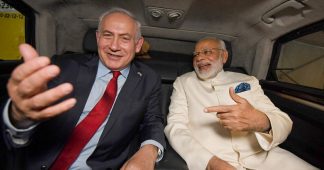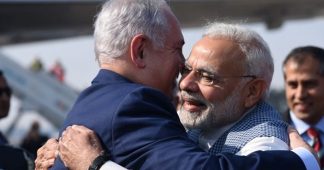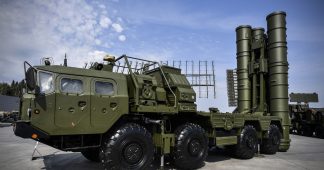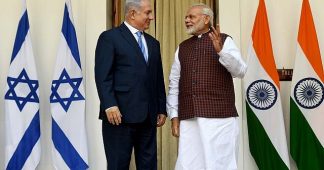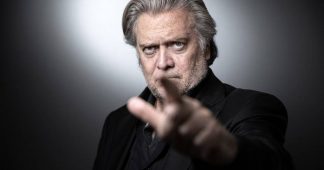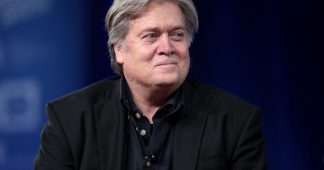By Rashmee Kumar
When Indian Prime Minister Narendra Modi and U.S. President Donald Trump held up their clasped hands on stage in Houston this past weekend, more than 50,000 people who had been awaiting the pair burst into a loud rumble of approval. The crowd at NRG Stadium, brandishing Indian flags and pictures of the prime minister, greeted them with chants of “Modi” and “USA.” Some attendees were dressed in their finest saris adorned with thick gold necklaces and jingling bangles, while others wore their love for Modi on their sleeves.
Modi gushed profusely about Trump — the president was warm, friendly, energetic, “full of wit.” “You introduced me to your family in 2017,” Modi said, referring to his trip to the White House that summer, “and today I have the honor to introduce you to my family.”
While most Indians in the U.S. identify as Democrats and voted for Hillary Clinton in 2016, Modi and his right-wing Bharatiya Janata Party enjoy significant popularity in the diaspora — and the joint appearance opened up the potential to confer some of that support on Trump.
“You enrich our culture, you uphold our values, you uplift our communities, and you are truly proud to be American. And we are proud to have you as Americans,” Trump told the largely Indian American audience. “We thank you, we love you, and I want you to know that my administration is fighting for you each and every day.” He promised to “take care of our Indian American citizens before we take care of illegal immigrants that want to pour into our country,” but neglected to mention that about half of the nearly 4.5 million Indians in the United States are foreign-born, and a growing number of Indian migrants are crossing the U.S.-Mexico border.
With the words “Shared Dream, Bright Futures” on the large screen behind them, and American and Indian flags flanked on either side of the stage, Modi and Trump presented their twin agendas around border security and counterterrorism. “Both India and the United States understand that to keep our communities safe, we must protect our borders,” Trump said, as he promised to help India defend against “radical Islamic terrorism.”
On the face of it, the blockbuster “Howdy, Modi” event was the Indian American diaspora’s extravagant welcome to the Indian prime minister for the first time since his landslide reelection victory in May — complete with flashy musical and dance numbers. But beneath the cultural gloss, it was essentially a political rally for two nationalist world leaders, organized by a nonprofit with Hindu nationalist links.
For decades, a network of American groups affiliated with Hindu nationalist organizations in India has embedded itself in the diaspora by holding cultural and religious events, lobbying Congress, contributing to political campaigns, and acting as a mouthpiece for Modi and the BJP. Since the early 2000s, these groups have worked to expunge Modi’s once-tarnished reputation in the U.S., enlisting the Indian American community, about half of whom are Hindu, and U.S. lawmakers to defend his increasingly authoritarian agenda and whitewash his complicity in human rights abuses.
“Howdy, Modi” corralled not just Trump and tens of thousands of Indian Americans, but also a delegation of U.S. politicians, including Democratic House Majority Leader Steny Hoyer and Texas Republican Sens. John Cornyn and Ted Cruz, who appeared on stage to shake hands with Modi in tacit support of his government’s Hindu nationalist agenda.
Behind the Spectacle
The fanfare surrounding the Indian prime minister’s visit was jarring in light of recent moves by Modi and the BJP that have had calamitous consequences for Muslims in India. In August, more than 1.9 million people — mostly Muslims — were excluded from a government citizenship list in Assam and given 120 days prove that they are not living illegally in India. Eleven detention camps, each of which can hold at least 1,000 people, are reportedly being built in the state. On the other side of the country, Modi’s government unilaterally revoked Kashmir’s autonomous status and decision-making capacity, established in Articles 370 and 35A of the Indian Constitution, jolting the Muslim-majority region with mass arrests, a communications blackout, and violent clashes with security forces.
Meanwhile in Houston, the prime minister fiercely praised the Indian Parliament’s action. “Article 370 had deprived people of Jammu and Kashmir and Ladakh of development. Terrorist and separatist elements were misusing the situation. Now after abrogation, people there have got equal rights,” he said. The crowd, and even some journalists in the press box, cheered and stood to clap.
“‘Howdy, Modi’ is a blatant celebration of the destruction of democracy and a complete disregard for human rights,” said Sana Qutubuddin, an organizer with the Alliance for Justice and Accountability, a coalition of progressive South Asian American groups.
Behind the event was Texas India Forum, which has direct links to members of U.S.-based Hindu nationalist groups affiliated with the Rashtriya Swayamsevak Sangh, a fascist paramilitary organization that espouses the notion that India should be a Hindu state and its minorities second-class citizens.
The nonprofit is registered to the residence of Houston employment lawyer Amit Misra, a coordinator of the Hindu Education Foundation — the education wing of the Hindu Swayamsevak Sangh, the international branch of the RSS. The Hindu Education Foundation is known for its role in lobbying against using the term “South Asia” rather than “India” to describe the modern-day region that stretches from Pakistan to Bangladesh, and for objecting to middle school textbooks that explicitly link the caste system to Hinduism. (Texas India Forum did not respond to multiple requests for comment.)
The chair of the “Howdy, Modi” organizing committee, Jugal Malani, is the brother-in-law of the national vice president of the HSS and an adviser to the Ekal Vidyalaya Foundation of USA, an education nonprofit whose Indian counterpart is affiliated with an RSS offshoot. Malani’s nephew, Rishi Bhutada, was the event’s head spokesperson and is a board member of the Hindu American Foundation, known for its aggressive tactics to influence political discourse on India and Hinduism. Another spokesperson, Gitesh Desai, is president of Houston’s chapter of Sewa International, a service organization linked to the HSS. The event was also backed by more than 600 “welcome partners,” including groups with Hindu nationalist ties.
Modi began fostering ties with Hindu nationalist groups in the U.S. to help build sympathy within the Indian American community after the U.S. rejected his visa application in connection with the 2002 Gujarat riots, during which Hindu mobs unleashed terror on Muslims after the community was blamed for a train fire that killed Hindu pilgrims. Women were raped, homes and mosques destroyed, and up to 2,000 people were killed. Modi, who at the time was chief minister of the state, was accused of overseeing the violence.
Among the thousands who demonstrated across from the venue on Sunday were progressive South Asian Americans and their allies who oppose Modi’s Hindu nationalist agenda.
“There’s a presence of so many religious and cultural minorities — Dalits, Indian Christians, Indian Muslims, Buddhists, and Sikhs — because we’re standing up for our kin who are facing great deals of oppression and atrocity at home, and we won’t be silenced in the face of that violence,” said Thenmozhi Soundararajan, an activist with the Alliance for Justice and Accountability.
While Hindu nationalist groups in the U.S. have developed the community infrastructure and connections to organize such massive events as “Howdy, Modi,” Soundararajan explained that they represent only a sliver of the South Asian American community.
“They’re a small, well-organized group that is trying to use money to show that they have power,” she told The Intercept.
Political Dissonance
The Democratic Party has fractured over its position on India in recent weeks. Several progressive Democrats, including Sen. Bernie Sanders, I-Vt., and Reps. Ilhan Omar, D-Minn., and Pramila Jayapal, D-Wash., have spoken out against Modi’s actions in Kashmir, while others in the party have been unwavering in their support. Rep. Ro Khanna, D-Calif., has most pointedly criticized Hindu nationalist ideology and was denounced by Indian and Hindu groups in response.
Nonetheless, there were six Democrats among the 21 lawmakers who joined Modi on stage. Even New York Rep. Tom Suozzi, who faced severe criticism in August for a letter he wrote to Secretary of State Mike Pompeo expressing concerns over Kashmir, attended, waving and pressing the palms of his hands together when his name was called. In response to the outrage generated by his letter, Suozzi had called a community meeting of his Indian American constituents and apologized for not consulting them before sending it.
Also present were Hoyer, Rep. Sheila Jackson Lee, D-Texas; Rep. Carolyn Maloney, D-N.Y.; Rep. Danny Davis, D-Ill.; and Illinois Rep. Raja Krishnamoorthi, who last year attended the World Hindu Congress, an event known for giving a platform to Hindu nationalists, including RSS chief Mohan Bhagwat. Texas Democratic Rep. Al Green’s name was announced, but he had put out a statement the day before that he would not attend “Trump’s photo-op.” Rep. Linda Sánchez, D-Calif., was also originally scheduled to appear. Her spokesperson did not respond to a question about why she pulled out.
With Modi standing behind him, Hoyer recited a quote from Mahatma Gandhi on democracy as “something that gives the weak the same chance as the strong.” He said that the U.S. and India provide “an equal opportunity to dream and work hard to make that dream come true.”
“I’m proud, as all of you are, that the U.S.-India relationship remains bipartisan, both Democrats and Republicans working to bring the two nations closer in pursuit of that goal and our common principles,” he said.
When asked if Hoyer’s presence at the event could be seen as supportive of Hindu nationalism, his spokesperson pointed to the representative’s reference to India’s efforts to secure the vision of Gandhi and the first Indian Prime Minister Jawaharlal Nehru of the country as “a secular democracy where respect for pluralism and human rights safeguard every individual.”
But under Modi, India’s founding ideals have been desecrated as far-right Hindus have become emboldened by the administration, and hate crimes against Muslims and other minorities have skyrocketed.
Links to Modi and Hindu nationalism can even be found in at least three Democratic presidential campaigns. Hawaii Rep. Tulsi Gabbard has received large donations from individuals involved in Hindu nationalist groups, including Malani and the Bhutada family, since the start of her political career. Joe Biden’s Asian American Pacific Islander national vote director, Amit Jani, is a Modi supporter, and his father was a co-founder of the Overseas Friends of the BJP.
South Bend Mayor Pete Buttigieg’s policy director Sonal Shah was a former national coordinator of the Vishwa Hindu Parishad of America, and her father was a former OFBJP vice president. Buttigieg’s campaign spokesperson said that Shah had “helped raise money for earthquake victims in 2001” with VHPA and pointed to a statement she made when she was on Barack Obama’s transition team that she “would not have associated with VHP of America” if she could have known the role its Indian counterpart would have in the Gujarat riots.
Activists pointed out the tensions between Democrats appearing at a Modi event while the party as a whole decries Trump and his xenophobic immigration policies. Soundararajan questioned the conflicting political messages of liberal lawmakers who associate with Hindu nationalism.
“If the Democrats are serious about being the resistance, does justice end at the border?” she asked. “Can we afford to be progressive domestically but fascist abroad?”
In September, right when Congress came back in session, the Hindu American Foundation held a Senate briefing on Kashmir to push its perspective on the repeal of the constitutional articles that ensured Kashmir’s autonomy and the history of the region.
“I’m not sure how many staffers attended, but [HAF was] already there to counter the narrative that’s been emerging from the media and activists, saying that everything is fine and the media is just exaggerating,” said Hafsa Kanjwal, a Kashmiri American history professor at Lafayette College.
Republicans, of course, experience no such contradiction. Apart from the Texas senators, GOP lawmakers on stage included North Dakota Sen. Kevin Cramer, Kentucky Gov. Matt Bevin, and Texas Rep. Pete Olson, who wore a kurta, or traditional Indian tunic, to the event.
At times, the Republican agenda has intersected with the interests of right-wing Hindu lobbyists. The Republican Hindu Coalition, founded in 2015, has recently taken up the cause of building Trump’s border wall, with founder and Modi supporter Shalli Kumar offering to raise $25 million for the project. Kumar has also named Steve Bannon as an honorary co-chair of the coalition (a title he shares with former House Speaker Newt Gingrich). Kumar reportedly accompanied the former Breitbart executive chairman, who has been involved in the construction of a private border wall, to fundraise at the U.S.-Mexico border
“Diaspora Diplomacy”
Houston has been a hub of Hindu nationalist activity in the U.S. since at least the late 1970s, when its HSS chapter was founded. Years before Modi was even a contender for prime minister, the Houston chapters of the HSS and the OFBJP were mobilizing from thousands of miles away to get him elected. Ramesh Bhutada, the HSS vice president, played a prominent role, organizing a 700-person phone-banking campaign for Modi, said Pieter Friedrich, a South Asia affairs analyst who has documented Gabbard’s ties with Modi and American Hindu nationalists.
At “Howdy, Modi,” the Indian prime minister thanked those who participated in the 2019 elections; the OFBJP organized phone banks to call Indians and ask them to vote for Modi, and some nonresident Indians even went to their home states in India to campaign and vote in the election.
Hindu nationalist organizations have historically portrayed themselves as liberal social and religious groups that denounce bigotry and uphold equality, Friedrich told The Intercept, while developing and maintaining close ties with Hindu nationalists in India who are openly hateful and violent toward minorities. In 2014, South Asia Citizens Web released a report showing how the network of Hindu nationalist groups in the U.S. had funneled millions of dollars to their counterparts in India since 2001.
“Hindu nationalists in America have utilized their minority status to protect themselves while supporting a majoritarian supremacist movement in India,” Friedrich said.
The Indian government has historically been disengaged with the Indian diaspora. At the time of India’s founding, Nehru adopted a policy of “active disassociation” from the diaspora, choosing not to intervene in another country’s sovereignty, writes Sreeram Chaulia, a professor at India’s Jindal School of International Affairs.
Migration from India was also seen as a “brain drain” of skilled and educated Indians that contributed to the underdevelopment of the country. Modi has turned this narrative on its head by framing the diaspora as a shining representative of India on the world stage that generously gives back to its homeland.
The BJP has strategically deployed “diaspora diplomacy” to recruit India’s overseas community to support its agenda and counter negative press coverage. In the 1980s, the BJP was the political voice behind a campaign to build a Hindu temple on land where a mosque already existed. The campaign’s supporters claimed that the Babri mosque was on a holy site that was considered the birthplace of a Hindu deity.
The Overseas Friends of the BJP was formed right before the Vishwa Hindu Parishad and other Hindu nationalist groups razed the mosque in 1992, igniting deadly intercommunal violence that killed at least 2,000 people. The OFBJP was tasked with damage control in the U.S. It has since mobilized to lobby congressional officials and campaigned abroad for Modi’s bids for prime minister. With the help of American Hindu nationalists, Modi periodically connected with the diaspora through videoconferences from 2007 to 2012, Friedrich writes in his article, while he was banned from entering the U.S.
“It is in the best interest of the BJP to nurture the Indian diaspora. They are our biggest soft power,” Vijay Chauthaiwale, head of the BJP’s foreign affairs cell, told Indian news site News18 ahead of “Howdy, Modi.” “PM Modi has been interested and extremely committed to make this diaspora an informal ambassador of his development agenda. They represent the Indian local community. For the BJP, it is important to nurture them along with the local community.”
Modi became prime minister in 2014 and with that, his U.S. visa was finally approved. A five-person committee connected to American Hindu nationalist groups organized a grand welcome for him at Madison Square Garden in New York City that was similar in magnitude to “Howdy, Modi.” He expressed his gratitude to an audience of about 20,000 Indian Americans, describing them as “my countrymen who, having settled here thousands of miles away from India, have increased India’s honor and pride.”
Five years later in Houston, Modi remained committed to cherishing his relationship with the Indian American community, despite the many miles of land and ocean between them.
“Today, you may be far away from your homeland,” he said, “but your homeland’s government is not far from you.”
Correction: September 25, 2019, 4:38 p.m.
A previous version of this story stated that Rep. Linda Sánchez, D-Calif., attended “Howdy, Modi.” She was originally scheduled to appear, but she was not present at the event.
Published at https://theintercept.com/2019/09/25/
